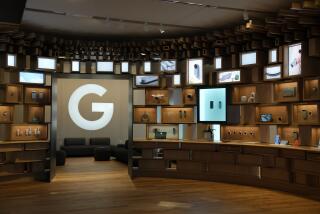Engineer guilty of trying to give documents to China
A Chinese American engineer was found guilty Thursday of conspiring to send information about U.S. Navy technology to China that would make it easier to detect U.S. submarines.
Chi Mak, a naturalized citizen, was convicted of conspiracy to violate export control laws, attempting to violate export control laws, acting as an unregistered agent of the People’s Republic of China, and lying to the FBI.
After six weeks of testimony in U.S. District Court in Santa Ana, the jury deliberated less than three days.
“We were confident about this case from the start,” said Assistant U.S. Atty. Gregory W. Staples.
Prosecutors described Mak as a sleeper agent who began preparing for his assignment in the U.S. in the 1960s, when he moved from China to Hong Kong, then a British colony. Federal agents said Mak admitted sending military-related documents to China and they found thousands of pages of the files in his home.
“To the extent that there is Chinese espionage going on in the United States, I hope [the conviction] sends a strong message,” said Assistant U.S. Atty. Craig H. Missakian.
Defense attorney Ronald Kaye, saying Mak is a loyal American, accused the government of overstating the facts. He also accused prosecutors of using xenophobia to get a conviction.
“It’s a sad day for our country when fear of the foreigner was the means by which the government was able to obtain a guilty verdict,” Kaye said.
Mak’s conviction gave a boost to federal prosecutors who had suffered setbacks in two high-profile cases involving naturalized citizens accused of spying for China. Critics in the Chinese American community said Katrina Leung and Wen Ho Lee were singled out because of their ethnicity.
Leung, a businesswoman and activist in the Southern California Chinese community, was an FBI informant accused of being a Chinese double agent. Those charges were dropped, and she pleaded guilty in 2005 to lying about a sexual affair with an FBI agent and filing a false tax return.
Lee, a Los Alamos National Laboratory scientist, was accused in 1999 of stealing nuclear secrets for China. He pleaded guilty to the lesser charge of mishandling classified computer files. Last year, the U.S. government and five news organizations, including the Los Angeles Times, agreed to pay Lee $1.65 million to settle a lawsuit alleging that his privacy had been violated by leaks that portrayed him as a spy.
Mak, who is being held without bail at Santa Ana Jail, smiled and hugged his attorneys when he walked into the courtroom Thursday. When the verdict was announced, he quietly lowered his head, not saying a word. One of his attorneys, Marilyn Bednarski, rubbed his back.
“This was a tough case, a difficult one,” U.S. District Judge Cormac J. Carney told jurors. He also told them not to discuss the classified information they had reviewed. “You take it to your graves, so to speak.”
Sentencing was set for Sept. 10. Mak, 67, faces a maximum of 45 years in prison. His wife, brother and sister-in-law and their son also have been charged in the case and will be tried next month.
Mak was an electrical engineer at Anaheim-based Power Paragon Inc., a firm that works mostly on Navy contracts. The FBI watched him for about 18 months, using cameras, wiretaps and microphones hidden in his car and work cubicle.
Mak, who lives in Downey, was accused of taking data that was not classified but which the government said was sensitive and embargoed from China. Witnesses testified that some materials could be bought from the website of the American Society of Naval Engineers until the government put a stop to it, several months after Mak’s arrest.
The prosecution’s case was built around three encrypted computer disks containing military-related information. Mak’s brother and sister-in-law were arrested Oct. 28, 2005, just before boarding a plane to China with the disks. The disks contained information about an electric propulsion system for warships, a solid-state power switch for ships and a PowerPoint presentation on the future of power electronics.
Mak testified that the information was intended for two friends in Hong Kong, who also were electrical engineers, and Pu Pei Liang, a family friend in Guangzhou. He said Pu takes care of his sister-in-law’s aging mother and has an interest in consumer electronics. The FBI said Pu is Mak’s Chinese intelligence handler.
Mak said the disks had information he thought was in the public domain because it was presented at three symposiums that foreigners attended.
In his closing statement, Missakian asked jurors to question why the disks were encrypted and why Mak’s friends needed information about U.S. military technology.
Engineers who worked with Mak said he is a brilliant workaholic. Defense attorneys said he took his work with him even when he took vacations. He had planned to retire last year, possibly in Hong Kong.
The government said Mak confessed that he had sent information to China for about 20 years. Mak admitted lying about trips he took to China and about his family but testified that he never confessed to passing sensitive information to China. Mak’s alleged admission came during the only interrogation that federal agents did not tape.
Defense attorney Bednarski said Mak spends his time in jail reviewing engineering books and writing the authors.
More to Read
Sign up for Essential California
The most important California stories and recommendations in your inbox every morning.
You may occasionally receive promotional content from the Los Angeles Times.









